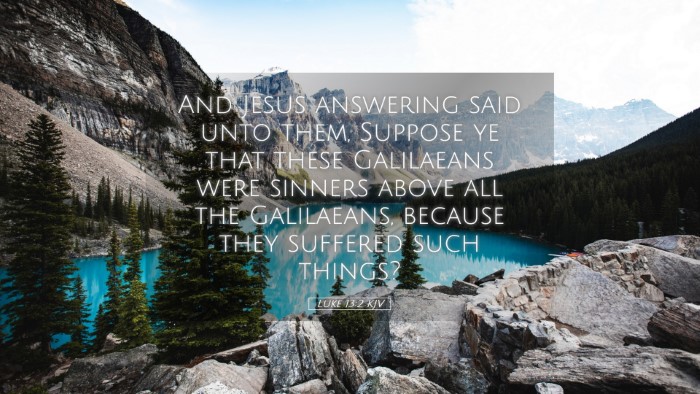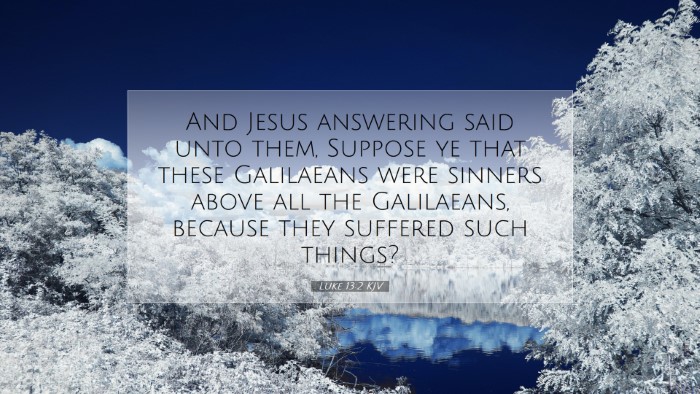Commentary on Luke 13:2
In this critical passage, Jesus addresses a tragic event that had befallen the Galileans, which was a significant discussion point in His time. This verse serves as a profound reflection on the nature of human suffering and divine justice, captivating the attention of theologians and scholars alike.
Contextual Background
The context of this verse is essential in understanding its implications. Jesus indicates that the Galileans whose blood Pilate had mingled with their sacrifices faced a dire fate. This was an event that would have shocked the listeners of Jesus' teaching, as it suggests that such calamities must have been a consequence of sin.
Theological Reflections
This verse raises crucial theological questions regarding sin, tragedy, and God’s justice. In many public domain commentaries, particularly Matthew Henry’s, we find an emphasis on the misunderstanding of suffering as a direct punishment for sin. Henry argues that although suffering can sometimes correlate with personal sin, it is not always the case. The implication here is profound: suffering’s existence does not always equate to divine judgment.
Matthew Henry's Insight
Henry insists on the importance of humility and repentance in the face of calamity: "Unless ye repent, ye shall all likewise perish." This directive not only serves as a warning but also as a call to self-examination. Henry encourages readers not to merely speculate on the sins of others or judge their circumstances but to reflect deeply on their own standing before God.
Albert Barnes' Commentary
Albert Barnes expands on the nature of God’s justice, suggesting that events like the one described serve as a reminder of human mortality and the necessity of repentance. Barnes states that "The danger of perishing is universal; it is a moral certainty that all must die and face judgment." He portrays suffering not as punishment for the individual's sins but as a general human condition stemming from the fall. This echoes the sentiments of many theologians regarding the problem of evil and human suffering.
Adam Clarke’s Perspective
Clarke discusses the societal implications of tragedy, emphasizing that calamities can lead to fear and the desire for righteousness among the living. He points out that the act of repentance is not only an acknowledgment of personal failings but also a means of aligning oneself with God’s will. Clarke writes, "Repentance is indispensable in escaping the perils of both temporal and eternal judgment."
Application for Today
For pastors and theologians today, Luke 13:2 serves as a critical text addressing contemporary issues of suffering, sin, and societal injustices. It remains relevant for discussions surrounding natural disasters, societal conflicts, and personal tragedies. Engaging with this verse prompts questions about how we, as a community of believers, interpret suffering in light of God’s sovereignty.
Call to Action
As such, the collective insights from Henry, Barnes, and Clarke lead us to a practical application: **Repentance and Reflection**. This is not just a recognition of individual sin but a call for the broader community to engage in reflection on the state of the world and the church. How can we be a voice for justice and mercy in times of tragedy? How can our responses to suffering embody the teachings of Christ?
Conclusion
Luke 13:2 challenges individuals and communities to not simply attribute suffering to personal sin but to view it as an invitation for self-examination, repentance, and a deepened reliance on God’s grace. It is a call to action that resonates through the ages, encouraging believers not only to look inward but also to seek outward expressions of compassion and support in a broken world.


